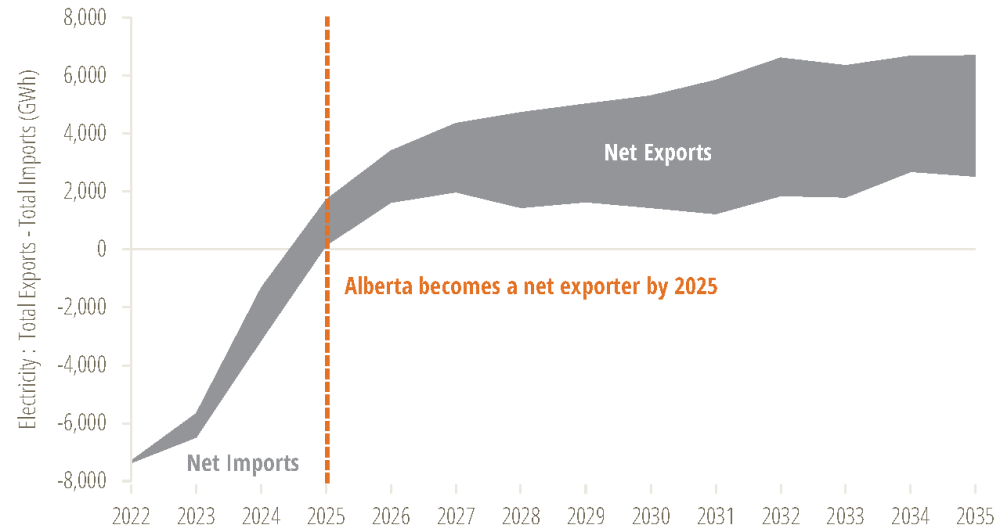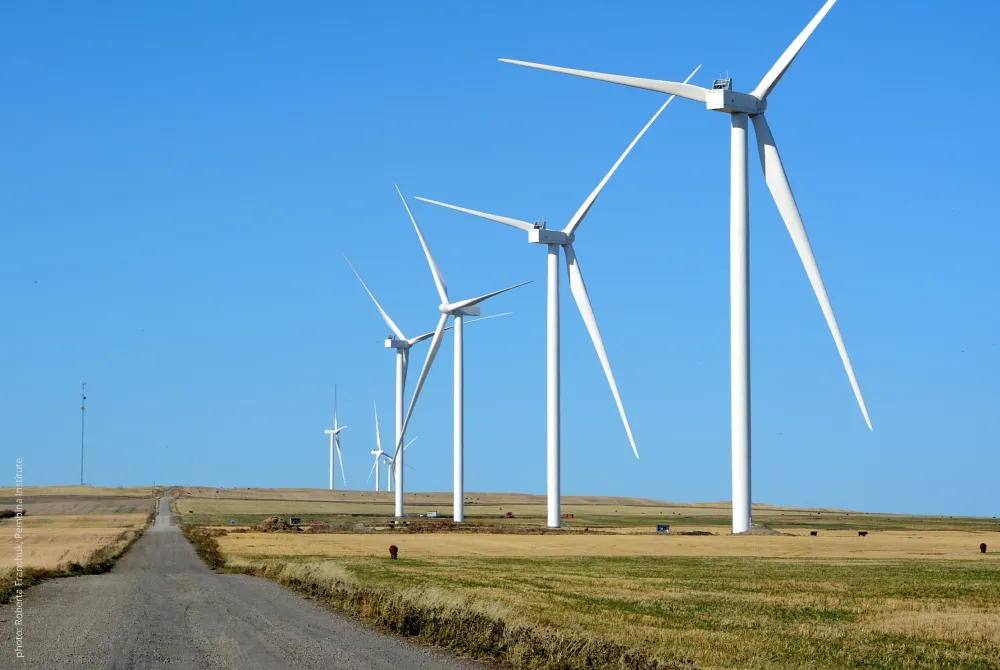CALGARY, AB — A new report from Pembina Institute finds that Alberta can decarbonize its grid by 2035 and it would be up to $28 billion cheaper than previous estimates.
Zeroing In: Pathways to an affordable net-zero grid in Alberta examines six decarbonization scenarios. The report finds decarbonizing Alberta’s grid by 2035 would save Albertans more than $600 per household in electricity costs annually, while reliably meeting our electricity demand. In all our scenarios, Alberta – which historically and currently imports more electricity than it exports – becomes a net exporter of electricity by 2025.

Modelled range of net electricity imports/exports between 2022 and 2035 shows Alberta becomes a net exporter of electricity by 2025. Decarbonizing Alberta’s grid allows the province to reap the economic benefits of being a net exporter of electricity. (Figure 17 from Zeroing In: Pathways to an affordable net-zero grid in Alberta)
Our findings underscore the unique economic opportunity for Alberta in growing its energy exports and leading the nation in wind and solar development. Already, billions of dollars are flowing into the province for new wind and solar projects. More than three-quarters of solar and wind generation capacity built in Canada last year was in Alberta.
Our modelling shows wind, solar and existing hydro could supply 45-58% of the province’s electricity demand by 2035. All sources of non-emitting generation — renewables and natural gas with carbon capture — could supply up to 80% of demand, with the remaining balance met by cogeneration, imports from neighbouring jurisdictions, and small amounts of unabated natural gas. Between 2023 and 2035, Alberta would increase its wind and solar fleet by three to five times their current combined installed capacity, creating significant opportunities for employment in the clean energy sector.
Alberta is at an inflection point in the evolution of its electricity grid. Decisions made today will dictate the configuration and affordability of its grid for decades to come. And, in the global low-carbon economy, a decarbonized grid is key to unlocking economic opportunities.
It is critical that Alberta commit to achieving a net-zero grid by 2035. This, in combination with establishing regulatory requirements or market policies, initiatives, and supports, is needed to provide policy certainty to generators, attract investments to Alberta, and enable the lowest-cost outcomes for ratepayers.
Quotes
Binnu Jeyakumar, Director of the Pembina Institute’s electricity program, and co-author of Zeroing In said:
“Alberta has a clean energy advantage, with an abundance of renewable resources readily available for electricity generation. The decisions the province makes today can help ensure a prosperous future for all Albertans.
"Alberta is in a unique position to grow its energy exports and create significant opportunities for employment in the clean energy sector while simultaneously reducing energy costs for Albertans and improving the reliability of its grid.
"Our analysis shows that, not only is grid decarbonization by 2035 possible in Alberta, but it is beneficial for Albertans and positions the province favourably to continue on its path towards becoming the renewable energy capital of Canada. Leveraging Alberta’s renewable energy advantage means the province can have an affordable, reliable, and clean electricity grid by 2035.
"It is critical that Alberta commit to a net-zero grid by 2035 to achieve this and not miss out on the wealth of opportunities that a clean electricity grid offers.”
[30]
Contact
Courtney Smith
Senior Communications Lead, Pembina Institute
647-797-9353
Background
Report: Zeroing In: Pathways to an affordable net-zero grid in Alberta
Backgrounder: Zeroing In Highlights





